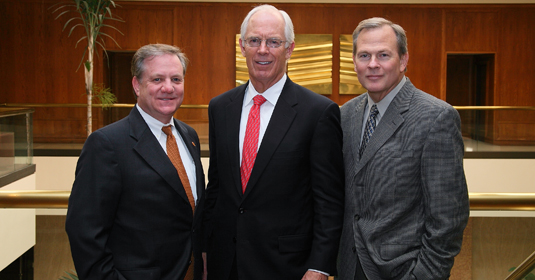The co-founder of Texans for Lawsuit Reform carries his cause to West Texas.
MIDLAND, TEXAS—Attendees to the February PBPA luncheon heard an appeal from Richard “Dick” Weekley, the co-founder, chairman, and CEO of Texans for Lawsuit Reform (TLR), a statewide tort reform organization dedicated to bringing fairness and balance back to Texas’ civil justice system.
At the Feb. 21 event, held at the Midland Petroleum Club, Weekley shared the past accomplishments of his organization and its hopes for continued success.
Created in 1993, TLR started slowly—hindered by the inertia of the political milieu in Austin—but slowly and steadily gained a foothold, eventually becoming a force to be reckoned with in state politics.
The situation for businesses in Texas in the early 1990s was a sharp contrast from today, Weekley said.
“For those of us who were in business here then, conditions were terrible,” Weekley said. “Out-of-control lawsuits, companies not expanding, doctors retiring early, especially in the Valley. Specialists, basically, had left the Rio Grande Valley and then of course if you had the privilege of doing business in Texas, Lloyds of London would charge you an extra 20 percent just for the privilege, because of our liability issues. So a group of us, literally a couple of tables of us, like we are here today, got together and said, ‘This is outrageous, we’ve got to do something about it.’”
Weekley said he then went to Austin and talked to some of the groups that had been working on this problem for the previous two decades. One of the biggest issues they were confronting was the profound influence exerted by the personal injury trial lawyers upon the Texas legislature.
“They [the Austin establishment] called us fools,” Weekley said. “They said we had no idea what we were doing. Which at the time was frankly true. They said the trial lawyer association won’t let you change [state politics]. The trial lawyers owned the legislature, and we were told we had no clue and no prayer at anything. But that didn’t stop us. So we went ahead and created this organization called “Texans for Lawsuit Reform,” which is now the largest lawsuit reform organization not only in Texas, but probably in the country. It really is not a special interest, it is a general interest. Literally it’s from doctors to lawyers, to oil and gas, to store keepers, to nurses, to teachers, who are on our team.”
Next came the need for a business plan and a strategy. And an intense phase of research. They hired a lobby team. And a media team. They built a speaker’s bureau, and equipped 42 individuals to speak around the state on the issues they faced. Just as Weekley was beginning to feel he had all the momentum on his side, he remarked to his lobbyist, “We’ve got it knocked,” whereupon the lobbyist “Just laughed at [him].” The problem? The lobbyist said to him, “Look, if you don’t change [the makeup of] the [state] senate, you can’t even debate your issue on the floor, much less pass it.”
So they created a Political Action Committe (PAC) and began the long, difficult task of campaigning for favorable, sympathetic candidates—candidates who could unseat legislators who were opposed to the ideals of TLR.
 “We didn’t know enough that we couldn’t do it,” Weekley said, “and we put this massive group together about 20 years ago and in our first year [of political activity] we passed eight separate bills. The next big reform was in 2003 when we were fortunate enough to get Tom Craddick as a speaker, and the reforms that Tom led in the House, and that the governor and the lieutenant governor led in the Senate, were by far the most massive [state] senate reforms ever passed in the history of the country. That was in 2003, and others have gone on since then.”
“We didn’t know enough that we couldn’t do it,” Weekley said, “and we put this massive group together about 20 years ago and in our first year [of political activity] we passed eight separate bills. The next big reform was in 2003 when we were fortunate enough to get Tom Craddick as a speaker, and the reforms that Tom led in the House, and that the governor and the lieutenant governor led in the Senate, were by far the most massive [state] senate reforms ever passed in the history of the country. That was in 2003, and others have gone on since then.”
Weekley confessed that he and his associates had thought that the reforms they wanted might take two or three years, max. He admitted that he had felt all he would need to commit of his own time was a year or two, “and then somebody else could do it.” But, as he remarked, “Here I am, 20 years later.”
In 2010, he said, the major battle was in the house. “We got involved in 27 races. We won 25 of the 27. But the most important, really, was that we went after 20 incumbent Democrats that had consistently voted against us and out of those 20 incumbent Democrats we were able to defeat 19. The normal incumbency rate of re-election is virtually 98 percent. Virtually all incumbents get re-elected. Everybody’s afraid to go after incumbents. I didn’t ‘read that book’ or something because that’s kind of what we do. If they vote against us and we think we have a chance of winning, we’ll go ahead. The action of 2012 was really at the 2012 Republican primary. We have a wonderful senate but some of the senators had become way too cozy with the trial lawyers and we had to contest a couple of Republican senators—Republicans holding seats that weren’t going to be vulnerable to a Democratic challenge. And then there were some open seats that we also got engaged in. Fortunately, we won all those races.”
Weekley went into detail about several races, sharing how his organization got out the vote and helped their candidates gain office.
Two years ago, the trial lawyers introduced 250 bills “that we [TLR] had to either defeat or take a clause out of them or whatever,” Weekley said. “It’s an ongoing massive effort. There is more on the agenda this year, and I recommend that anyone go to our website, www.tortreform.com for details.”
For April’s PBPA speaker, which was still not announced as of press time, go to www.pbpa.info and consult the calendar.
For many more photos from February’s PBPA luncheon, view our full digital copy.









